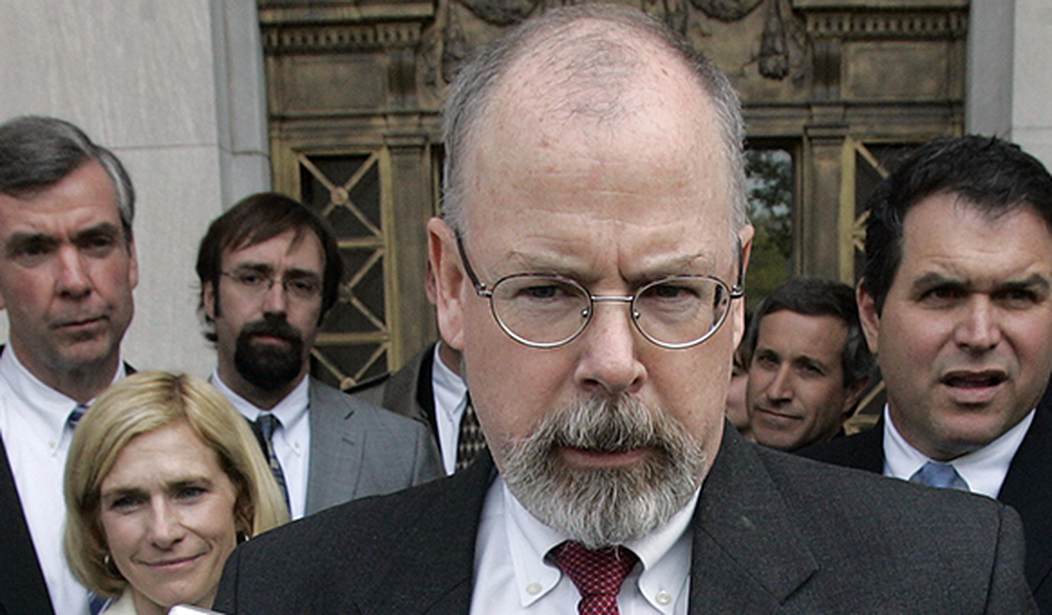Special Counsel John Durham in a Friday filing railed against former Hillary Clinton Campaign lawyer Michael Sussmann for his motion to dismiss the indictment against him for allegedly lying to the Federal Bureau of Investigations by claiming he did not lie and, if he did, the false statement was "immaterial."
Sussmann was indicted last year for making a false statement to the FBI in 2016 about his relationship with the Clinton campaign. Sussmann had claimed to have evidence of a connection between former President Donald Trump's presidential campaign and a Russian bank.
Despite billing records showing Sussman charged the Clinton campaign on numerous occasions for "work on the Russian Bank-1 allegations," Sussmann told the FBI that he was not providing the alleged evidence on behalf of any entity, according to the indictment.
Sussmann denies all the allegations against him and in February, he filed a motion to dismiss the indictment, claiming that his false statement was protected by the First Amendment and was "immaterial" to the FBI's investigation.
"Mr. Sussmann did not make any false statement to the FBI," Sussmann's defense team claimed. "But in any event, the false statement alleged in the indictment is immaterial as a matter of law. Furthermore, allowing this case to go forward would risk criminalizing ordinary conduct, raise First Amendment concerns, dissuade honest citizens from coming forward with tips, and chill the advocacy of lawyers who interact with the government."
But Durham argued in his filing Friday that Sussmann's motion to dismiss the indictment on this basis is "absurd."
Recommended
"The defendant’s false statement to the FBI General Counsel was plainly material because it misled the General Counsel about, among other things, the critical fact that the defendant was disseminating highly explosive allegations about a then-Presidential candidate on behalf of two specific clients, one of which was the opposing Presidential campaign," Durham wrote. "The defendant’s efforts to mislead the FBI in this manner during the height of a Presidential election season plainly could have influenced the FBI’s decision-making in any number of ways."
The Special Counsel's filing goes on to say that if Sussmann had been truthful, the FBI may have proceeded differently, such as opening a full investigation, a preliminary investigation or an assessment. The agency could have also decided to delay a decision until after the election or declined to investigate altogether, according to Durham.
"Here, had the defendant truthfully informed the FBI General Counsel that he was providing the information on behalf of one or more clients, as opposed to merely acting as a 'good citizen,' the FBI General Counsel and other FBI personnel might have asked a multitude of additional questions material to the case initiation process," Durham wrote. "They might have asked, for example, whether the defendant’s clients harbored any political biases or business motives that might cast doubt on the reliability of the information."
Durham further asked the courts to reject Sussmann's motion to dismiss, noting that the defendant is a "sophisticated and well-connected lawyer" and not "in the vulnerable position of an ordinary person whose speech is likely to be chilled."
Sussmann "chose to bring politically-charged allegations to the FBI's chief legal officer at the height of an election season," Durham wrote. "He then chose to lie about the clients who were behind those allegations. Using such rare access to the halls of power for the purposes of political deceit is hardly the type of speech that the Founders intended to protect. The Court should therefore reject defendant's invitation to expand the scope of the First Amendment to protect such conduct."

























Join the conversation as a VIP Member